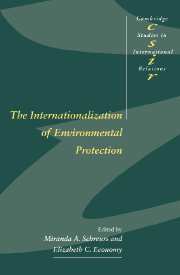Book contents
- Frontmatter
- Contents
- List of contributors
- Preface
- 1 Domestic and international linkages in environmental politics
- 2 Chinese policy-making and global climate change: two-front diplomacy and the international community
- 3 The domestic politics of global biodiversity protection in the United Kingdom and the United States
- 4 Domestic and international linkages in global environmental politics: a case-study of the Montreal Protocol
- 5 The internationalization of environmental protection in the USSR and its successor states
- 6 Domestic institutions and international environmental agendas in Japan and Germany
- 7 Zimbabwe and CITES: illustrating the reciprocal relationship between the state and the international regime
- 8 The European Union: bridging domestic and international environmental policy-making
- Index
- CAMBRIDGE STUDIES IN INTERNATIONAL RELATIONS
2 - Chinese policy-making and global climate change: two-front diplomacy and the international community
Published online by Cambridge University Press: 08 March 2010
- Frontmatter
- Contents
- List of contributors
- Preface
- 1 Domestic and international linkages in environmental politics
- 2 Chinese policy-making and global climate change: two-front diplomacy and the international community
- 3 The domestic politics of global biodiversity protection in the United Kingdom and the United States
- 4 Domestic and international linkages in global environmental politics: a case-study of the Montreal Protocol
- 5 The internationalization of environmental protection in the USSR and its successor states
- 6 Domestic institutions and international environmental agendas in Japan and Germany
- 7 Zimbabwe and CITES: illustrating the reciprocal relationship between the state and the international regime
- 8 The European Union: bridging domestic and international environmental policy-making
- Index
- CAMBRIDGE STUDIES IN INTERNATIONAL RELATIONS
Summary
The political and economic reforms that have swept China since 1978 have had a marked effect on China's behavior in the international arena, engendering increased linkages with the international community on a range of issues such as trade, technological development, and arms control. During the late 1980s and early 1990s, there was also a remarkable growth in China's interaction with the international community on environmental issues. This interaction has had a profound impact in several respects on China's participation in international environmental accords on issues such as ozone depletion, biodiversity, and climate change. It has substantially broadened the range of policy alternatives that China considers in response to these environmental problems and has provided the People's Republic of China with access to new technologies and funds that are crucial to any response that China might undertake. At the same time, the influence of the international community remains sharply constrained. In international negotiations, China routinely reiterates its commitment to principles that limit its obligation to respond to global environmental concerns: state sovereignty, Third World-First World inequity, and the responsibility of the advanced industrialized states.
This chapter examines the nature of China's participation in the international negotiations to address one of these environmental issues: global climate change. Specifically, it explores the scientific, energy, and political debates within China that surrounded the issue of climate change; how these debates have influenced China's international negotiating stance; and the process by which international actors influenced both the nature of these debates and China's response strategies in preparation for the United Nations Conference on Environment and Development (UNCED) in June 1992.
- Type
- Chapter
- Information
- The Internationalization of Environmental Protection , pp. 19 - 41Publisher: Cambridge University PressPrint publication year: 1997
- 11
- Cited by

